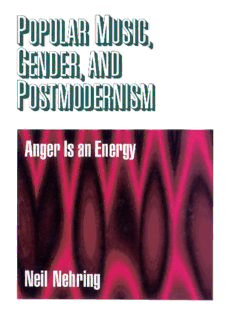
Popular Music, Gender and Postmodernism: Anger Is an Energy PDF
Preview Popular Music, Gender and Postmodernism: Anger Is an Energy
iülwii NatHH Anger Is an Energy il lilehri ® SAGE Publications international Educational and Professional Publisher Thousand Oaks London New Delhi Copyright © 1997 by Sage Publications, Inc. All rights reserved. No part of this book may be reproduced or utilized in any form or by any means, electronic or mechanical, including photocopying, recording, or by any information storage and retrieval system, without permission in writing from the publisher. For information: SAGE Publications, Inc. 2455 Teller Road Thousand Oaks, California 91320 E-mail: [email protected] SAGE Publications Ltd. 6 Bonhill Street London EC2A4PU United Kingdom SAGE Publications India Pvt. Ltd. M-32 Market Greater Kailash I New Delhi 110 048 India Printed in the United States of America Library of Congress Cataloging-in-Puhlication Data Nehring, Neil, 1957 Popular music, gender, and postmodernism : Anger is an energy / Neil Nehring. p. cm. Includes bibliographical references and index. ISBN 0-7619-0835-8 (cloth). — ISBN 0-7619-0836-6 (pbk.) 1. Punk rock music—History and criticism. 2. Feminism and music. 3. Anger in music. 4. Postmodernism. I. Title. ML3534.N44 1997 781.66—dc21 97-4590 This book is printed on acid-free paper. 97 98 99 00 01 02 03 10 9 8 7 6 5 4 3 2 1 Acquiring Editor: Margaret Seawell Editorial Assistant: Rente Piernot Production Editor: Astrid Virding Production Assistant: Denise Santoyo Copy Editor: Joyce Kuhn Typesetter/Designer: Danielle Dillahunt Cover Designer: Ravi Balasuriya i Contents Acknowledgments vn Introduction ix PARTI 1. No Respect for Suffering: An Introduction to Postmodernism 2. The Vicious History of Aesthetics: Romanticism, Modernism, and Postmodernism on Mass Culture and Ressentiment 21 3. Collaborating With the Oppressors: Postmodern Academics on Music 54 4. Kurt Cobain Died for Your Sins: Postmodernism in Music Journalism 79 PART 2 5. Emotional Rescue: Feminist Philosophy on Anger 107 6. The Post-Postmodern Voice: Emotion and Writing About Music 128 Ί. The Riot Grrrls and Carnival 150 Notes 180 Index 195 About the Author 203 i Acknowledgments This book is for my daughter Julia, who was born shortly after I came home from a Babes in Toy land/My Bloody Valentine show. After hearing her first musical composition, "I Want a Blue Guitar" (the only line), Fm confident she'll grow up to be a Riot Grrrl. I owe a great deal to many of my students over the years, who have not only kept me up to date but also supplied crucial insights into all the issues in this book. I want to thank Chidsey Dickson, in particular, for his generosity in sharing useful material and for his general encouragement. The many bright young people I have known possess a decency—an honesty and hopefulness—sorely lacking in many older intellectuals. My conviction on this account animates the entirety of the book: It's why I'm angry, if you have to ask. Further confirmation of my outrage appeared just as the book went to press, when the postmodern cynicism that I document went through still another recycling with regard to alternative rock: see Thomas (Tom) Frank's more- fatalistic-than-thou response ("Authenticity Crisis, Baby," Nation, 3 February 1997, p. 10) to Jon Pareles ("Alternatives to Alternative: What's Next?," New York Times, 15 September 1996, sec. H, p. 34). vii viii POPULAR MUSIC, GENDER, AND POSTMODERNISM Parts of this book have been published in another version, which the author gratefully acknowledges permission to reprint: "Rock Around the Academy," American Literary History 5 (1993). Reprinted by permission of Oxford Uni versity Press. Introduction My favorite new song in 1992 was Bikini Kill's "Carnival." Among the first Riot Grrrl groups, BK delivers a visceral feminism through punk rock. At the time I was a 35-year-old SWM (straight white male) English professor, married and a new parent, and fortunate enough to live in the musical hotbed of Austin, Texas. The only changes since then are that I'm older, of course, have another child, and go out less than ever. By the standard that "difference" in identity from SWMs determines authenticity, it may seem like sexploitation on my part to offer a testimonial to Riot Grrrls and to what feminism has to teach us about the political importance of anger. My previous work admittedly doesn't bode well for such a project. Γ ve featured too many white males and expressed too confident a faith that humanity can cope with the "postmodern" world. That easy sort of generalization about humanity, in particular, is something I have since regretted. As black and feminist scholars have pointed out about invoking humanity in general, a white male speaking confidently for everyone else ignores the privilege that allows him to be so secure, so untroubled by the ambiguities and contradictions of individual and collective identity. In the worst instances, it's often implicit that only white males actually count. The chief culprit in either case, historically, has ix
Description: